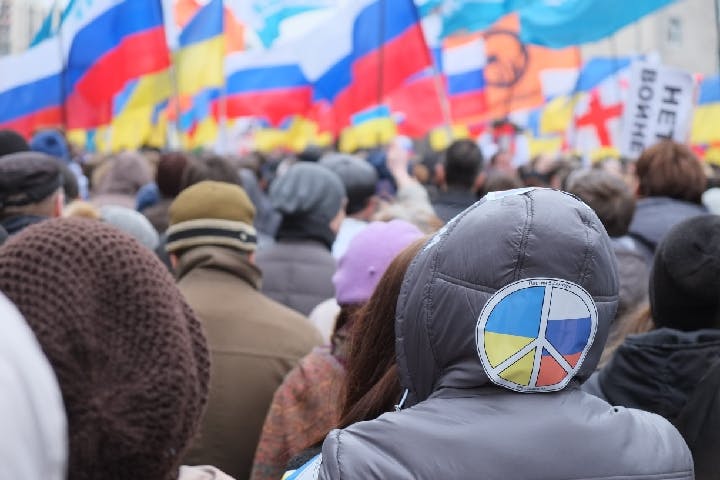Do minorities have a place in Putin’s Russia?
– Carlo Massimo
In a rising Russia, patriotism is the order of the day. For some Tatars, Russia’s biggest minority, that’s good news. Others are refusing to buy in.
Russia, more than most other countries, knows the difference between nations — ethnic, cultural, geographic bodies — and sovereign countries. The Russian Federation alone contains dozens of discrete nations: ethnic Russians, of course, but also Yakuts in the east, Chechens and Ossetians in the Caucasus, ethnic Ukrainians, Russian Jews, and a widely dispersed population of Muslim Tatars. Each nation speaks its own language, practices its own religion, and follows its unique traditions. They are citizens of, and outsiders in, a Federation dominated by ethnic Russians.
This diversity poses a major obstacle to Russian President Vladimir Putin’s political agenda. Since the early 2000s, Putin’s government has pushed for a strong, conservative patriotism across the Federation. Russia, as Putin sees it, is on the rise, well on its way to resuming its old status as superpower. That new power needs shoring-up at home. Slavophile clubs, nationalist militias in Russia’s European enclaves, and an invigorated Orthodox Church are key buttresses in Moscow’s snarling ascent.
This new, aggressive Russian patriotism has resonated in some strange places — notably among Russia’s Tatar population, which constitutes 13 percent of the Federation’s population, and that only twenty years ago wanted nothing to do with the new Russia.
Descendants of the Asian horsemen who overran Russia in the Middle Ages, the Tatars are neither Slavs nor Christians, and their interactions with the Russians have long been tense. Even after the heyday of mounted marauding, the Tatars often befriended Moscow’s enemies, such as the Ottoman Empire; when Hitler invaded the Soviet Union, the SS recruited all-Tatar units.
Moscow, in return, has treated the Tatars harshly. Stalin notably exiled the Crimean Tatars en masse to Central Asia. In the 1990s, Moscow shut down a popular Tatar push for independence. And today’s Crimean Tatars, allowed back only in 1988, widely resent last year’s Russian takeover of their homeland.
But Putin’s program declares itself to be patriotic, not nationalist. This is a critical distinction. A nationalist program would foster loyalty to the Russian nation — the ethnic Russians, at the expense of the Tatars (and the Ukrainians, and the Chechens, and the Federation’s other constituent nations). A patriotic program, on the other hand, directs the people’s devotion to the sovereign state of Russia. Nationalism pits nation against nation; patriotism unifies ethnic groups. At least, it purports to. The organ of Tatar patriotism under Putin is the RTNKA, a government agency whose initials stand for Regional Tatar National-Cultural Autonomy. Housed in the historic Moscow mansion of a wealthy Tatar, the RTNKA seeks to promote Tatar culture in tandem with loyalty to Russia. The organization's longtime president, Rasim Akchurin, summed up the agency’s patriotic mission in 2007:
I think that patriotism must not have any nationalist dimension. We must have a patriotism of Muscovites, patriotism of Russians [citizens of the Russian Federation] but not a Russian or a Tatar [ethnic] patriotism. … I am profoundly convinced about it. If I am ready to give my life, I will give it for the Russian, the Jew, the Armenian… for all the people who live here, because I am a real patriot. (75)
To this end, RTNKA publishes hagiographic titles like Tatars: Soldiers, Workers, and Patriots (2007) and biographies of carefully selected Tatar luminaries, such as Musa Dzhalil, a Lenin Prize laureate and Hero of the Soviet Union. RTNKA also hosts folk dance recitals and concerts, offers Tatar language lessons, and promotes a moderate, apolitical Islam. In all this, RTNKA assiduously avoids politics, especially questions of nation. Such discretion allows the Tatars to celebrate their native culture, and to proclaim the Tatars’ integral role in Russian history and in the fabric of Russian society.
It’s an optimistic vision: the Tatar nation fulfils itself while, even by, aligning itself with the greater Russian motherland. And like most optimistic visions, it has its critics: a number of prominent Tatars balk at the RTNKA’s blithe patriotism, which does not take on the marginalization of Tatar culture by a rearing Russian nationalism. “My personal opinion,” said Tatar politician Refkat Galimov in 2011, “is that the [RTNKA was] created to mislead public and international opinion. Until the law… in Russia is changed and as long as the media and power institutions continue to stigmatise people of ‘Caucasian nationality’… the artificially created [RTNKA] will do nothing.”
The question at hand, beyond the Tatars, is whether Putin’s patriotic mission is really in good faith, or whether it’s Russian nationalism in disguise. There is an element of both at play: Tatar culture, after all, has seen something of a renaissance under the aegis of RTNKA and the Russian government. But in the context of government-funded nationalist biker gangs, a Russian Orthodox clergy publicly damning their Ukrainian counterparts, and Putin’s endorsement of aggressive irredentism among the Russians of Ukraine and Moldova, Russian patriotism does not seem that far removed from Russian nationalism. Under the rice of the Tatar pilaf, it seems, is a fat Russian pork chop.
* * *
The Source: Françoise Daucé, “Patriotic Unity and Ethnic Diversity at Odds: The Example of Tatar Organisations in Moscow,” Europe-Asia Studies, 67:1 (2015) 68-83
Photo courtesy of Shutterstock/Vereshchagin Dmitry
